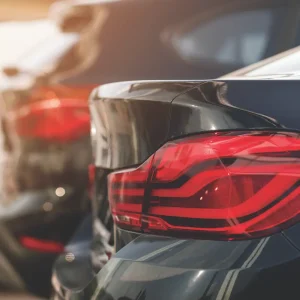At its cheapest, aftermarket technology costs nothing, and smartphone apps are a good place to start if you want some handy and helpful kit for free. Alphabet’s app, known as AlphaGuide, is free to download, regardless of whether or not you’re a customer of the leasing firm.
“There are a couple of driver functions like points of interest, so if you want to go to the nearest charging point, the app will guide you,” Alena Milte, Alphabet’s product development manager, tells BusinessCar. “There’s also the mileage tracker to track business and private miles, which is a big topic in the UK.
“Then there’s a mobility timeline, which combines all the dates in your diary so you can see different travel options. You can compare the company car to public transport and the various different options, times, costs etc., from going to meeting A to meeting B.”
Although it’s open to all, the app also contains a series of functions specific to those with an Alphabet lease vehicle.
“If the driver has an accident, a report is issued immediately on their phone; they don’t need to call us and we can deal with it straight away,” adds Milte. “[It] also gives you information about how long the contract lasts, when it ends and other details.”
As for more physical technology, dashcams start from less than £50 per unit and could save a heap more.
“Most, but not all, larger fleets self-insure, and if 30% of all accidents are split liability and you could prove, say, half of those were not your fault, then the savings are very, very big,” explains Richard Browning, director at dashcam specialist Nextbase.
“We’re working with one fleet based in the North East with 1000 vehicles and they’re spending £30,000 a month on debatable split-liability claims. Straight away, you could presume that that could be halved or even greater, because we often see the commercial sector being less at fault than the consumer sector.
“There’s no lease with these products either. We’re not putting them in and saying ‘we also want a subscription for £20 a month’ or anything like that.”
Telematics occupies the pricier end of the aftermarket scale and the costs vary depending on the size and make-up of the fleet, but it offers the kind of granular detail other technologies can’t match.
“We launched a product about reliably capturing floating car data, the actual information that tells you the state of the car in terms of its health, through [on-board diagnostics] and other systems,” says Alex Rothwell, chief technology officer at Masternaut. “There’s a number of telematics companies with similar products, but essentially, in that data is things like direct warning signs, fault signs, service intervals etc.
“It gives real-time reporting from the vehicle in terms of engine faults and warning signals. For example, if your brake pads are running low, that’ll light up on our platform for the fleet manager [as well as in the car itself]. There’s also the service interval thing – you can say ‘give me a list of all the vehicles that need servicing next month’ and get a full set of results.”





